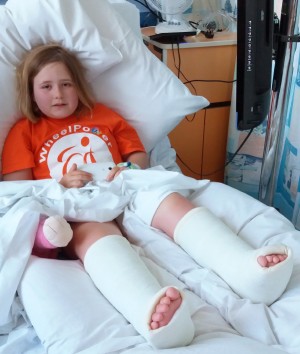Archived
Please note, this page may contain outdated information or subject matter.

Supported by Action, new research aims to develop a treatment to help children like Isla, who suffers from a debilitating neurological condition that damages the peripheral nerves.
Charcot Marie Tooth disease (CMT) is a rare, inherited condition. Its symptoms can include muscle weakness, numbness and problems with balance. Hands, arms, legs and feet can all be affected and sadly symptoms can become worse and more disabling over time.
Isla, now 10, had just started school when she first showed signs of having the condition. Initially she hadn’t seemed badly affected but gradually her feet began to turn in and her walking and balance suffered. She’s needed surgery to lengthen the tendons in both feet and now regularly uses a wheelchair.
Isla also suffers severe pain in her legs which gets worse as the day progresses.
“Sometimes by the evening she wants to hold my hand all through dinner because she’s in so much pain,” says Isla's mum, Karen.
Although Karen also has CMT she has never been affected by nerve pain so her daughter’s suffering has come as a shock.
Isla takes daily medicine to help relax the nerves in her legs and regularly needs painkillers. For walking short distances she wears special shoes, provided by her local hospital, as the shape of her feet has changed. She also has physiotherapy and wears splints on her legs at night time.
“I suspect Isla will need further surgery and we’ve accepted that she’s going to be using a wheelchair long term. For us, the biggest issue is pain management,” says Karen.
Despite the challenges she faces, Isla remains positive and is a competitive swimmer. “She wants to swim in the Paralympics one day!” says Karen proudly.
In the UK, around 25,000 people are thought to have CMT. There’s currently no cure and no way to slow its progression but new research hopes to change this. Action funding of almost £200,000 is supporting a three-year study at the University of Oxford. Professor David Bennett and his team are in the early stages of developing a new treatment – a form of gene therapy – to help children with CMT type 1A. This is the most common form of the disease and the type that Isla has.
The team are looking at ways to stop, slow down or even repair damage to a substance called myelin. Myelin normally forms a protective coating around the peripheral nerves but in children with CMT it becomes damaged.
Karen says: “It’s nice to know that CMT is getting noticed and that this work is going on.”
